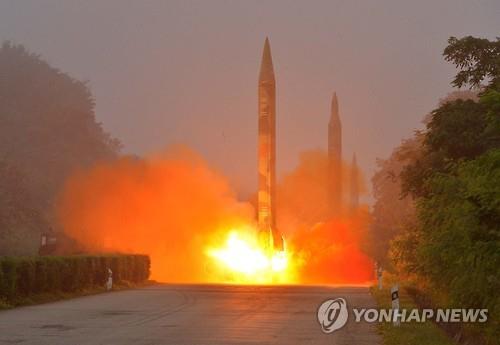- California Assembly OKs highest minimum wage in nation
- S. Korea unveils first graphic cigarette warnings
- US joins with South Korea, Japan in bid to deter North Korea
- LPGA golfer Chun In-gee finally back in action
- S. Korea won’t be top seed in final World Cup qualification round
- US men’s soccer misses 2nd straight Olympics
- US back on track in qualifying with 4-0 win over Guatemala
- High-intensity workout injuries spawn cottage industry
- CDC expands range of Zika mosquitoes into parts of Northeast
- Who knew? ‘The Walking Dead’ is helping families connect
S. Korea military says THAAD could intercept Rodong missiles fired at steep angle
SEOUL, July 21 (Yonhap) — South Korea’s military said Thursday that the advanced U.S. anti-missile system that will be in place by the end of 2017 can intercept a mid-range Rodong ballistic missile fired at a steep angle and heading for the southern port city of Busan.
The defense ministry’s analysis comes a day after the North said it conducted its latest ballistic missile launch with the aim of practicing pre-emptive strikes against ports and airfields in the South.
“Even if North Korea intentionally fires a mid-range Rodong missile at a very steep angle in order to strike Busan, simulations have shown that we can shoot it down using the Terminal High-Altitude Area Defense (THAAD),” a ministry official said.
The altitude of a Rodong missile fired in Hwangju, south of Pyongyang, will be around 100-150 kilometers when it passes over Seongju, which has been tapped by Seoul to host the THAAD battery. Seongju lies 296 km southeast of Seoul.
The analysis is based on the assumption that the North will intentionally reduce the range of the Rodong from 1,300 km to just 600 km by shooting it higher into the air.
The ministry said Rodong’s altitude is within the engagement envelope of THAAD, making it possible to knock it out of the sky. On the other hand, existing Patriot missile batteries with an operation altitude of 15-40 km are just not able to make such an intercept.

In this photo, released by the North’s state-run Rodong Sinmun newspaper on July 19, 2016, one of three ballistic missiles is being launched in Hwangju, south of Pyongyang.(For Use Only in the Republic of Korea. No Redistribution)
On Tuesday, Pyongyang test-fired three missiles — two Scud and one Rodong — in an apparent “armed protest” against Seoul’s decision early this month to deploy a THAAD battery to counter growing nuclear and missile threats from the North.
“The drill was conducted by limiting the firing range under the simulated conditions of making pre-emptive strikes at ports and airfields in the operational theater in South Korea, where the U.S. imperialists’ nuclear war hardware is to be hurled,” North Korea said in an English dispatch carried by the Korean Central News Agency.
A photo released by the North showed missiles heading for various parts of South Korea, including Busan, the country’s No. 1 port.













Myra Amritsar
July 22, 2016 at 2:48 AM
If this happen then it will become brutal attack.